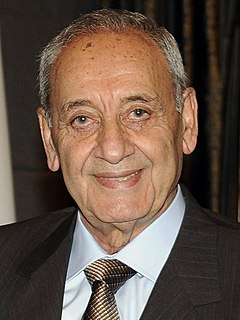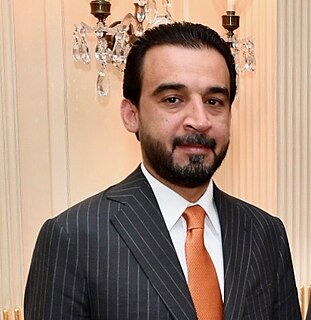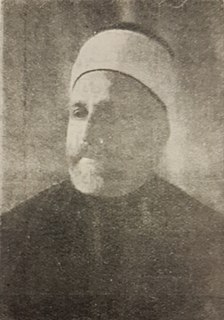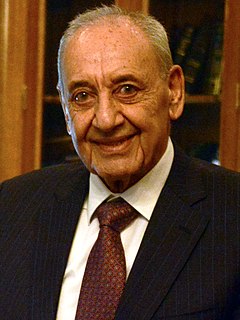
Dame Eleanor Fulton Laing, is a British politician serving as the Member of Parliament (MP) for the Epping Forest constituency since 1997. A member of the Conservative Party, she has served as Chairman of Ways and Means and Deputy Speaker of the House of Commons since 2020.

Nabih Berri is a Lebanese Shia politician who has been serving as Speaker of the Parliament of Lebanon since 1992. He heads the Amal Movement.

The National Assembly is the directly elected house of the Parliament of South Africa, located in Cape Town, Western Cape. It consists of four hundred members who are elected every five years using a party-list proportional representation system where half of the members are elected proportionally from nine provincial lists and the remaining half from national lists so as to restore proportionality.

The Council of Representatives, usually referred to simply as the Parliament is the unicameral legislature of the Republic of Iraq. As of 2020, it comprises 329 seats and meets in Baghdad inside the Green Zone.

The Lebanese Parliament is the national parliament of the Republic of Lebanon. There are 128 members elected to a four-year term in multi-member constituencies, apportioned among Lebanon's diverse Christian and Muslim denominations but with half of the seats reserved for Christians and half reserved to Muslims per Constitutional Article 24. Lebanon has universal adult suffrage. Its major functions are to elect the President of the republic, to approve the government, and to approve laws and expenditure.

The Majilis is the lower house of the bicameral Parliament of Kazakhstan, known as the Parlamenti, in the Government of Kazakhstan. The upper house of Parliament is the Senate of Kazakhstan. There are 107 seats (98+9). Members of Parliament are elected to five-year terms.

The People's Assembly is Syria's legislative authority. It has 250 members elected for a four-year term in 15 multi-seat constituencies. There are two main political fronts; the National Progressive Front and Popular Front for Change and Liberation. The 2012 elections, held on 7 May, resulted in a new parliament that, for the first time in four decades, is based on a multi-party system. In 1938, Fares Al-Khoury became the first Christian to be elected Speaker. In 2016 Hadiya Khalaf Abbas, Ph.D., representing Deir Ezzor since 2003, became the first woman elected to be the Speaker. In 2017, Hammouda Sabbagh became the first Syriac Orthodox Christian to have held the post.
Mirwais Yasini میرویس یاسینی is the current First Deputy Speaker of the Lower House of the Afghan Parliament. Following the Communist coup in 1978, Mirwais Yasini worked actively to combat the Soviet invasion, and went on to oppose the Taliban from 1993 to 2001 as a social and political activist. After the fall of the Taliban regime in 2002, Yasini began his political career as the Director of Foreign Relations and Economic Evaluation for Afghanistan's Ministry of Finance, and as a prominent member of the Emergency Loya Jirga, which met in Kabul. Since that time he has held several high-level political posts, including such titles as the First Deputy Speaker of the Constitutional Loya Jirga and Director General of the Counter Narcotics Department.

A series of rounds in the Lebanese presidential election were held from 23 April 2014 until 31 October 2016. No candidate reached a two-thirds majority vote in the first round, and subsequent rounds failed to gain a quorum. Finally, in the forty-sixth round held on 31 October 2016, Michel Aoun, a Member of Parliament and formerly a disputed Prime Minister and Acting President in a rival government near the end of the Lebanese Civil War, was elected with 83 votes in Parliament. He took office the same day as the 13th President of Lebanon since independence in 1943.

General elections were held in Kuwait on 5 December 2020. Two-thirds of the incumbents lost their seats, including the 2016 parliament's sole woman MP Safa Al Hashem.

Mohammed Rikan Hadid al-Halbousi is an Iraqi politician who is currently the Speaker of the Council of Representatives of Iraq since 15 September 2018. He was previously the governor of Al Anbar Governorate since 29 August 2017. He is the leader of Progress Party.

The 53rd New Zealand Parliament is the current session of Parliament in New Zealand. It opened on 25 November 2020 following the 17 October 2020 general election, and will expire on or before 20 November 2023 to trigger the next election. It consists of 120 members of Parliament (MPs) with five parties represented: the Labour and Green parties, in government, and the National, Māori and ACT parties, in opposition. The Sixth Labour Government has a majority in this Parliament, with Jacinda Ardern as prime minister.

Sheikh Mohammad ibn Husayn ibn Muhammad al-Jisr was a Lebanese cleric and politician who served as the Speaker of the Parliament of Lebanon from 18 October 1927 to 10 May 1932.

The legislative speaker of Lebanon is the highest office in the legislative body of Lebanon.

The 2018 Speaker of the Lebanese Parliament election was the 6th legislative speaker election since the implementation of the Taif Agreement, held on 23 May 2018 during the first session of the 23rd parliament. The incumbent Speaker Nabih Berri and head of the Amal Movement was re-elected to a sixth term.

The 2005 Speaker of the Lebanese Parliament election was the 4th legislative speaker election since the implementation of the Taif Agreement, held on 28 June 2005 during the first session of the 23rd parliament. The incumbent Speaker Nabih Berri and head of the Amal Movement was re-elected to a fourth term.

The 2005 Speaker of the Lebanese Parliament election was the 3rd legislative speaker election since the implementation of the Taif Agreement, held on 28 June 2005 during the first session of the 23rd parliament. The incumbent Speaker Nabih Berri and head of the Amal Movement was re-elected to a third term.

The 2022 Speaker of the Lebanese Parliament election was an election to elect the speaker of the 24th Lebanese Parliament. It was 7th legislative speaker election since the implementation of the Taif Agreement in 1989.
Since the parliamentary election in October 2021, there has been a political crisis in Iraq, with members of the Council of Representatives of Iraq being unable to form a stable coalition government, or elect a new President. For 10 months the national political system has been in a political deadlock.

















